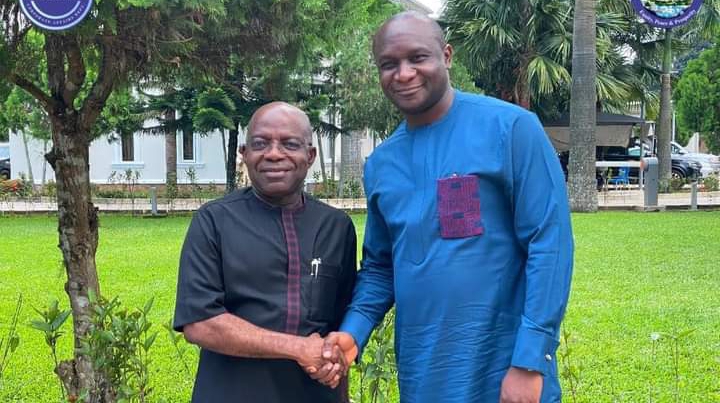NDDC Inaugurates Aquaculture Centre In Abia, Advances SDGs On Poverty Eradication
The Niger Delta Development Commission, NDDC, has inaugurated an Aquaculture Training Centre in Elugwu-Umuntu, Olokoro community in Umuahia South Local Government Area of Abia State, as part of its efforts to boost agriculture in the Niger Delta region.
Speaking during the commissioning, the NDDC Managing Director, Dr. Samuel Ogbuku, stated that agriculture was one of the key agendas of President Bola Ahmed Tinubu’s administration, noting: “This initiative is a strategic alignment with the United Nations’ Sustainable Development Goals (SDGs), specifically targeting the eradication of poverty (SDG 1) and hunger (SDG 2).
“The Centre is poised to become a cornerstone in these efforts, addressing these pressing global issues by empowering local communities through sustainable agriculture and skill development.”
Ogbuku observed that agriculture was one of the sustainable means of empowering women and youths, through the creation of jobs in the country.” This approach reflects the broader SDG strategy of promoting sustainable economic growth, providing decent work for all, and supporting resilient agricultural practices that contribute to the overall health and stability of the community, ensuring no one is left behind in economic development,” he said.
He assured that the center would address the challenges of unemployment by offering relevant trainings in aquaculture, promising that 50 youths from the Umuntu community would be enlisted for training in the centre.
The NDDC Chief Executive Officer announced that facilities at the centre would be improved upon and expanded to provide the necessary training, as well as enhance development in the adjoining communities. He said that the commitment to continuous improvement underscores the sustainability aspect of the SDGs, ensuring that initiatives introduced are not only beneficial in the short term but also contribute to long-term sustainable development.
Ogbuku said further: “Coming on board the NDDC management, we decided as a policy to ensure that all projects initiated by the Commission are completed and not abandoned. As part of our policy, we are going to slow down on awarding contracts for new projects and focus on completing ongoing projects.”
- Advertisement -
In his speech, the NDDC Director, Abia State office, and Representative of the state on the Board of the Commission, Chief Dimgba Eruba, commended the Managing Director for demonstrating dedication to the Commission’s vision of providing the much-needed sustainable solution to the socio-economic challenges of the Niger Delta region. This vision is in line with the SDGs’ holistic approach, which recognises the interconnectivity between economic growth, social inclusion, and environmental protection.
He said: “This commissioning ceremony is a testimony of the fact that NDDC is fully committed to the developmental plans and commitment of the President of the Federal Republic of Nigeria, His Excellency Bola Ahmed Tinubu, to a Renewed Hope Agenda for a greater and prosperous Nigeria.
“The Aquaculture Training Center Umuntu is envisioned to be a skill acquisition hub and an economic catalyst that will empower a good number of our growing population on how to breed, raise and harvest fish, and make a profit from the enterprise.”
Eruba charged the people of Umuntu Olokoro community to protect the “valuable and viable” project, as it would attract other physical infrastructural development around it. He remarked that the project would benefit not only persons from Umuntu and the immediate environ but also others interested in fish farming in Abia state and Nigeria at large.
In an address read on behalf of the community by Hon. Ifeanyi Umekwe, they thanked the NDDC for siting the Aquaculture Training Centre in their community. They also extended the appreciation of their Traditional Ruler Eze Paul Ogwubunka. They said: “It is important to note that this project has suffered massive setbacks like vandalism due to the isolated nature of the site. We will want to appeal to the NDDC to take into consideration the plight of our community, which has a serious problem of bad road network which has made life unbearable for our people.”
Giving a brief on the project, the Head Project Monitoring and Supervision in the NDDC state office, Engr. Kingsley Azu, said that the Aquaculture Training Centre consisted of eight fish housing tanks; two hatcheries, two lecture blocks; a six-room staff quarters; a four-room office block; a generator house and a power generating set. The facility, he said, also had eight units of solar-powered street light and a water supply system, consisting of a borehole, an overhead tank, and reticulation.
The NDDC Director, Agric and Fisheries, Mrs. Winifred Madume, appealed to the benefiting communities to see the Training Centre as their own and protect it from vandals and thieves. She noted that the sense of ownership and responsibility was crucial for the long-term sustainability of the initiatives designed to help achieve the SDGs, ensuring that these developments remain operative and productive for generations to come.




Comments are closed.